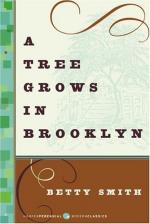|
|
A Tree Grows in Brooklyn Topic Tracking: Economics
Topic Tracking: Economics
Book 1, Chapters 1-6
Economics 1: The Tree of Heaven attracts poor people. Poor people are the subject of this novel. Francie's life, albeit economically poor and economically challenged, is rich with stories, tales, and adventure. She sees this tree as one who is rich, because it cares for poor people.
Economics 2: Francie and Neeley exchange their junk for shiny pennies. A single penny is regarded as wealth amongst the poor youngsters of Brooklyn in 1911. They can use it for candy or games.
Economics 3: Katie Nolan, a beautiful young woman and mother, must scrub floors as a janitress in order to make enough money to put food on the table for her two young children and her husband. Johnny works occasionally and does not bring in enough money to sustain the family. The Nolan family is not strong economically; this weakness is not due to laziness, and the kids develop the strong work ethic needed to make ends meet.
Economics 4: Katie puts extra money and collects change in an old tin can bank. The bank lives throughout the novel in many forms. Since the family is poor, they do not use a real bank, and instead create their own from an old can.
Book 2, Chapters 7-14
Economics 5: The young married couple, Johnny and Katie, make money initially by taking care of a school. When Johnny loses the job on the grounds of recklessness, he worries about money for his new family. Lack of money is a constant stress on this family.
Economics 6: When the Nolans move to Lorimer Street, they still do not have enough money to pay rent. The only way they can live there is if Katie cleans the houses and works as the janitress in exchange for rent. Katie is always doing physical labor in order to allow her family to continue to survive despite their lack of funds.
Book 3, Chapters 15-42
Economics 7: Katie realizes that money is not the key to prosperity, success, and richness. Education is the key. She knows that her children will have better lives if they are educated. Education will lead to economic well being.
Economics 8: Francie's teacher at school is cruel to the poor kids and does not allow them to go to the bathroom. Francie believes her negative treatment is a result of her poverty, of which she does not think she should be ashamed.
Economics 9: Johnny's death reminds the family of their dire economics problems. Katie buys an insurance package that gives the family $200. However, they do not see the money because it is used on the expensive funeral and burial costs and mourning clothes. Katie opens the tin can bank that is partially full and saved to buy land. They now own Johnny's lot and no longer need the money saved in the tin can bank; she spends it to cover the rest of the funeral cost.
Economics 10: Although Johnny never brought in a steady income, he did bring in enough small change to help the family through the tough times. The Nolan family is feeling the need for money, or the kids cannot return to school. McGarrity knowingly offers the children after-school jobs to help them until Katie's new baby arrives. He knows she will never accept charity, so he hires the kids for a generous wage.
Book 4, Chapters 43-54
Economics 11: Both Francie and Neeley work. They bring home their first paychecks and present them to Katie in a proud celebration. In Nolan custom, Neeley keeps his tips for spending money (as did his father) and Francie gets a fifty-cent allowance per week.
Economics 12: Neeley and Francie open up their own tin can bank in the Nolan tradition. They also take Katie shopping for a new non-mourning hat. They are able to enjoy what money they have with their family. They also have learned how to save and value money. Katie sets up a bank account for Francie's future college education.
Economics 13: The Nolan family has enough money, for once, to celebrate Christmas well. They even give some money to the musical Tynmore girls because they know how hard Christmas is without money.
Book 5, Chapters 55-56
Economics 14: With Katie's marriage to McShane, the family has enough money to relax, pursue their dreams, and allow Laurie to grow up in comfort. Katie gives $200 of her $1000 wedding present to Evy, because that is the sum of the insurance money she would have collected from Willie Flittman's death. Now that she has money, she still understands the importance of generosity and family.




